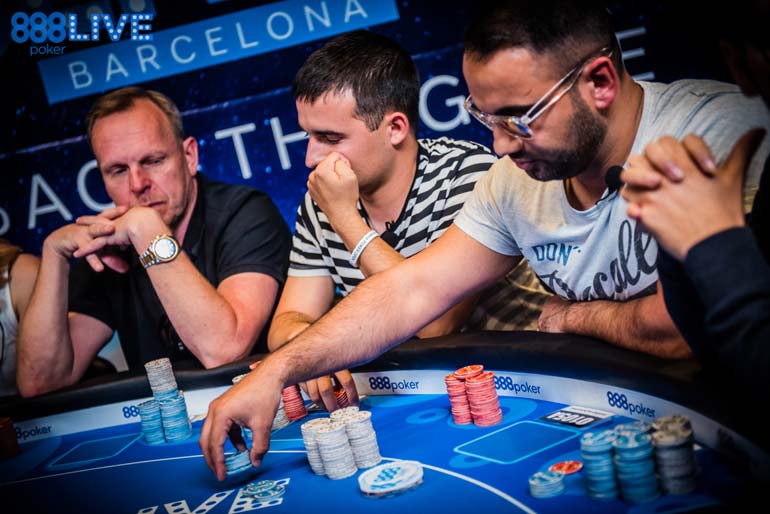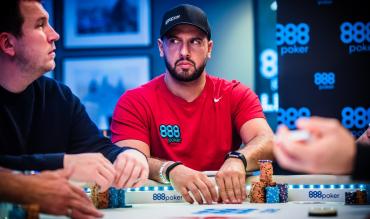In this guide, we will address both topics, including examples of bad beats, how to recover after suffering from bad beat hand, and what are bad beat jackpots and how to win them.
Table of Contents
What is Bad Beat in Poker?
What is considered a bad beat in poker, you ask? Well, it’s usually one of two things, both of which are quite similar:
- Where a player is an extremely high statistical favourite to win a hand but loses due to his opponent improving on a later street by hitting one of the few cards he needed.
- Where a player loses a poker hand with a powerful holding, relative to the board texture and the possibilities of what the best hands are to make.
Cooler vs Bad Beat in Poker
Before moving forward, it’s essential to address another term sometimes used interchangeably with “bad beat”, and that word is cooler.
In poker, a cooler is a hand in which all the money is bound to make it into the middle of the pot, and it’s quite unlikely that either player will be able to get away from their hand. Quite frequently, it involves two hands of extreme strength, just like a “bad beat”.
The word “cooler” isn’t that focused on the result as it is on the fact that all the money is likely going in because both (or all) players have hands of extreme strength.
Examples of coolers might include:
- AA vs KK, all-in preflop, 100bb deep (the two best Hold’em starting hands)
- AK vs AQ all-in preflop between two short-stacked players in a tournament
- AK vs 22 on A-K-2 (flopped top two pair vs flopped bottom set)
- KsQs vs As2s on Ts-Js-5s (flopped nut flush vs flopped 2nd nut flush)

Even though we don’t know the result of the individual hands, given the extreme strength of each player’s hand given the situation, that’s what makes it into a cooler.
While coolers can frequently be considered bad beats, too, perhaps the term of a “bad beat” may be better applied to the above scenarios after the following turn/river run outs:
- AA vs KK: board of 9c-3s-4h-2d-Ks, giving the KK a rivered 3-of-a-kind
- AK vs AQ: Where the AQ pairs up the Q and improves to win the hand
- AK vs 22: Where the AK turns or rivers another Ace/King after the A-K-2 flop, helping improve that hand to a higher boat than the 2’s
- As2s vs KsQs: Where the KsQs spikes the 9s on the river, improving to a straight flush vs the nut flush.
As such, you can see that bad beats usually take into account the result of the hand. The scenario typically involves a change of one hand being the equity favourite (for the hands involved) at least once.
Don’t get too hung up on the technicality of what’s considered a bad beat or a cooler, though. What’s going to be more critical is how you recover from it right after, which will be discussed later in this article.
Worst Bad Beat Ever
Especially in televised poker tournaments, you’re certainly going to see a fair share of bad beats being dealt. You’ll notice that some players lose their minds entirely and flip out (re Phil Hellmuth, anyone?) and other players take the bad beat in stride and are able to move on.
And yes – sometimes, it is going to be more difficult to swallow a bad beat based on the situation that at other times. Look at the WSOP Main Event of 2018 on the final table bubble of the most glamorised annual event in poker. The cards were dealt, and one player had AA, and two of the others had KK!
With million-dollar payouts at stake and the chance to win the most prestigious bracelet in all of poker, suffering a cooler like for both players with the KK’s this must have been intense!
Whether on a TV table or a regular table, bad beats are a part of poker that’s here to stay. What’s going to be crucial to learn, though, is how to move on after suffering a bad beat so that you can still play your A-game.
How to Deal With a Bad Beat in Poker
One of the things it’s crucial to realise in poker is how things average out over the long run. The more volume you put in, the more you’re likely you’ll see that you’re just as likely to have the Aces in AA vs KK coolers as you are to have the Kings.
In essence, the bad beats and coolers even out, and what’s going to determine your win rate is the small pots.
That aside, what truly distinguishes the amateurs from the pros is how they’ll let their tilt and rattled emotions from bad beats play a part in the decision-making of future hands.
So if you’re wondering what to do after a poker bad beat (or better yet how to recover from a bad beat in poker), here are some strategies to consider, if you find your emotions getting the best of you:
- Take a short break: If you know that you’re likely to punt off their stack in the next few hands after a bad beat, assuming you’re in a cash game, sit out for an orbit. Let yourself blow off some steam before returning more well-focused and re-grouped to the poker table.
- Take a longer, extended break from poker: If you notice more chronically that you’re always getting emotionally-tilted at the tables, step away from playing poker for an extended period. Take your mind off the game and the continual emotional turmoil. Whether it’s just a few days or the course of many weeks or months, poker will always be something that you can come back to in the future.
- Study Poker: Sometimes resetting things by coming back to the fundamentals is the way to go. Studying can help calm you down and put you in a mindset that is conducive to one that makes logical, sound decisions at the poker table (instead of emotionally brash ones).
Professional players realise that time is money, though. They can’t afford to take constant, extended breaks in a session or from the game to always refocus because otherwise, they won’t be making any money if they aren’t playing!
However, also they don’t want to be losing money if they keep playing and are still emotionally affected by a bad beat.
NOTE: The same thing goes for tournament players – unless you bust from the tournament, you can’t just up and leave for a bit to get a handle on your emotions; you have to keep playing and making good, logical-decisions as long as you’ve still got a stack. The tournament isn’t going to stop for your “emotional recovery” time.
As such, it’s essential to know and discover what tilt-free strategies will work best for you, but also to make an effort to make long-lasting changes to you being affected by tilt.
So, here’s some more long-lasting strategies regarding how to take a bad beat in poker:
- Practice Meditation and Yoga: These methods have been proven to help individuals tune in more to their breathing and focus, allowing them to exercise better thought processes and emotional control and improve their health and mindset.
- Use Coaching or Programs to Help Manage Your Tilt: Working with a mental game coach, or putting your time in working through a course to help you manage tilt can be very beneficial at giving you long-lasting changes to help you control your emotions. Check out this article by poker player/coach and writer, Jonathan Little regarding Getting Rid of Tilt.
- Get in the Right Mindset Before a Session: Whether it’s through listening to a “Primed Mind” audio track or putting in a study session before firing up your tables, getting yourself in the right mental state before a poker session even starts will help reduce the likeliness of tilt. And, it will minimise how hard tilt might potentially affect you when you’re holding a bad beat in poker.
Ultimately, it’s going to be critical to know how to deal with a bad beat in poker so that it doesn’t negatively affect your play in future hands in the session. This knowledge will help you to continue with a calm head and sound logic in your decisions moving forward.
Bad Beat Jackpot: Rewarding the Worst Bad Beats
Many cardrooms and even some online poker sites offer a bad beat jackpot (BBJ) to their players. How do you win a bad beat poker payout? By suffering a nasty bad beat that involves losing with a hand of a certain rank.
Though the qualifying hand will vary from place to place, the one most frequently used for the bigger bad beat jackpots is Quad Tens. This minimum means that if you lose with a hand of Quad Tens or better (and meet any other applicable criteria), you’ll win the bad beat poker payout!
Here’s a list of some of these additional criteria that may be used:
- Quads in a BBJ must be made using a pocket pair.
- Both hole cards need to be used in player’s five-card BBJ hand
- A specific dollar amount in the pot must be hit in the pot
These criteria will affect the odds of getting a poker bad beat jackpot and are frequently put in place to lessen the frequency of the bad beat payout. Be sure to check with your poker room on what additional criteria they might have for their terms and conditions for their BBJ’s.
While the player with the losing hand doesn’t win the entire jackpot, the most common split of a BBJ will be as follows:
- 50% to the loser of the hand
- 25% to the winner of the hand
- 25% to the rest of the table
Two additional factors that may affect payout amounts and percentages include:
- Room share, meaning all of the other players currently playing in the poker room but at another table will be paid a portion (i.e. 40/20/20/20 split).
- Re-seed amounts, meaning the casino reserves a percentage of the BBJ in advance to re-seed the next jackpot amount.
It’s essential to note that there will sometimes be “fixed” bad beat jackpots for losing with a particular hand(or better). These smaller BBJ’s will often run at the same time as the progressive one (meaning depending on the strength of the losing hand, the player/table might either win the small fixed BBJ or the bigger progressive BBJ).
Other times, a fixed BBJ will replace a progressive one altogether and award the same amounts to players regardless of the hand strength with which they lose! Usually, the mark for the qualifying hand is somewhere between Aces full of Tens or Aces full of Kings and might have a prize amount of around $25,000.
Note that the lower a qualifying hand is for a progressive bad beat jackpot, the lower the jackpot prize amount will typically be. As the odds of hitting a bad beat in poker increases, the jackpot will be hit more frequently, subsequently meaning the amount to be won will usually be lower.
Bad Beat Poker Conclusion
Bad beats in poker are just a normal part of the game. Developing emotional control is undoubtedly going to help you persevere through them and assist you in continuing to play your A-game immediately following.
And, who knows?Perhaps, if the bad beat is bad enough, maybe you’ll be rewarded with a jackpot!


